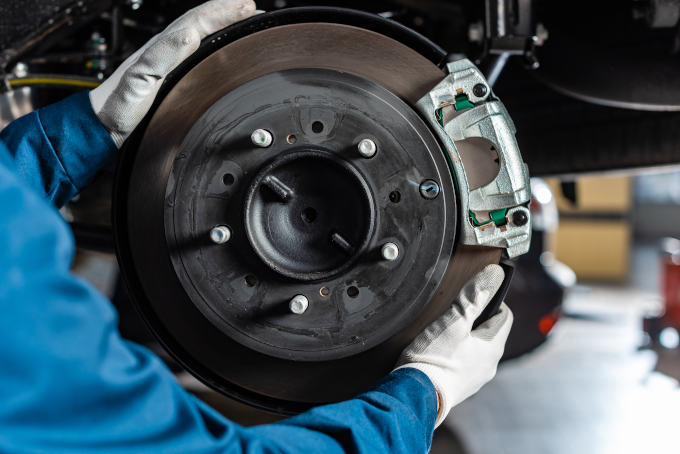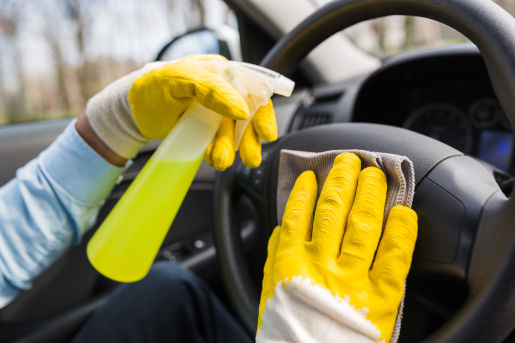Your vehicle is equipped with many sophisticated and high-tech mechanisms that ensure safe and efficient travel. Each time you fire up the ignition, numerous actions take place at once providing you with the power and dependability you expect from your car.
One piece of equipment that has changed little in basic design over the past 20 years is your braking system. While updates and advances have been implemented on brakes such as anti-lock and smart braking systems, the basics of brake development haven't changed all that much. Why? Because a vehicle's brakes are so dependable!
Unfortunately, like many parts of a vehicle, brake parts can deteriorate over time. The breakdown of your brake parts can lead to a variety of issues:
- Grinding, squealing or squeaking when stopping
- A pungent burning smell
- Abnormal wearing of tires and black substance on your wheels
- Loss of a solid brake pedal feel
- Low or leaking of brake fluid
- Brake pedal chatter or steering wheel shimmy when braking
- Inability or difficulty to come to a complete stop quickly
While some issues related to brake failure can seem like small annoyances, these symptoms can lead to dangerous and life-threatening accidents when left unchecked. If you take steps to avoid brake failure early, you can ensure that your brakes continue to work hard for you every day.
Here are seven ways that you can avoid brake failure with simple, routine practices:
Seven Steps to Avoid Brake Failure
1. Understand How Brakes Work
The first way to avoid brake failure is to learn more about your vehicle's braking system. One of the reasons brakes have seen relatively few updates over the years is due to their practical and simple design. There are many elements to your car's brakes, each operating in tandem when you press the brake pedal to stop. Learning more about how each part operates and how they work together can help you better understand each piece’s necessary maintenance.
2. Drive Defensively
Brakes will often wear down more quickly if you are prone to driving aggressively, tow, or carry heavy loads or even multiple passengers. Hard stops cause increased friction and therefore increased wear of your brake components. Over time, poor or aggressive driving habits will increase your brakes' wear and tear and can lead to brake failure. Driving in a more controlled way helps these vital parts stay durable and last longer.
3. Keep Up with Routine Maintenance
Many drivers avoid taking their car in for routine maintenance and repair until there is a failure. Avoiding regular maintenance can lead to larger and more expensive issues as small problems go unnoticed. Learn your vehicle's recommended maintenance schedule and make it a habit to have your brakes and brake fluid checked each time you go in for maintenance.
4. Pay Attention to Your Car's Warning System
Your vehicle is smarter than you may believe. Across your dashboard are several warning lights and systems that try to give you a heads-up that something is not quite right while driving. Learn the various warning lights and their meanings, and make sure to seek expert guidance as soon as any warning light turns on.
5. Note Any Symptoms of Brake Failure
As stated at the beginning of this article, brake component wear and failure has several tell-tale signs and symptoms. The moment you notice any sign of grinding, squealing, a burning smell, vibration, pulsation, or loss of brake response, it is time to head over to a qualified brake mechanic quickly. Don't wait until the brakes go out completely to get help!
6. Trust an Expert with Your Brake Repair & Replacement
A great aspect of brakes is the access to various brake parts for DIY repair or maintenance. While there are multiple resources available for learning how to repair your vehicle’s brakes yourself, it is highly recommended to trust your maintenance or repair to an experienced automotive technician. An expert can better diagnose issues related to brake failure. Automotive professionals are equipped with the experience and equipment to do the job safely, correctly, and to recommend preventative measures for addressing problems early.
7. Keep Your Car Clean
The final — and most straightforward — step in avoiding brake failure is also the easiest: keep your vehicle clean and pay attention to the signs! The dirt, grit, and grime accumulated on your wheels through everyday driving can hide signs of extreme brake pad wear and signs of fluid leakage. By keeping your tires, wheels, and wheel wells clean with tire-specific cleaning solutions that can remove the grime and dirt, you can perhaps notice early problems before they get too bad.
Simple Steps to Avoiding the Unthinkable
Taking simple steps to care and maintain your vehicle’s brake system can make a huge difference in avoiding the unthinkable. Take advantage of various online resources to learn more about your brakes and how to care for them which may allow you can keep your brakes working reliably for years to come.
If you aren't sure where to start in your brake maintenance journey, take the opportunity to practice a yearly brake check routine! Take care of your brakes, and your entire car will thank you; as will everyone else on the road.
We're Here to Help
AAMCO has more than 60 years of experience diagnosing, servicing, and repairing more than 20 million vehicles. Customers rely on us for:
- Quality workmanship
- Expert Technicians
- Superior service
- Best warranty coverage available
- Trustworthy, honest service
AAMCO Centers of Southern California and surrounding areas represent trust, quality, and value. Call us today!

 Schedule Appointment
Schedule Appointment















